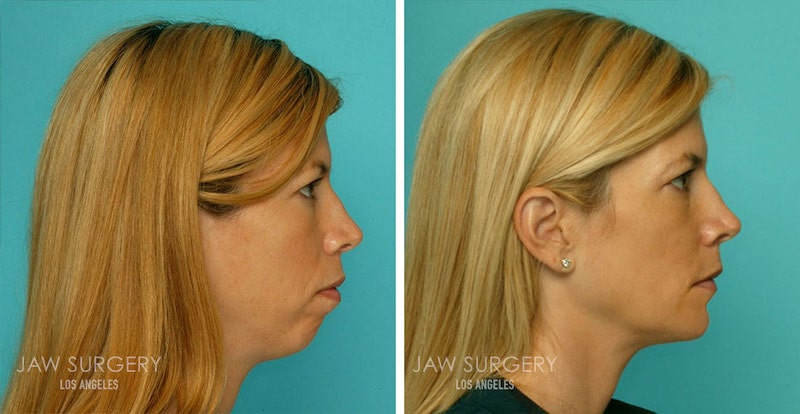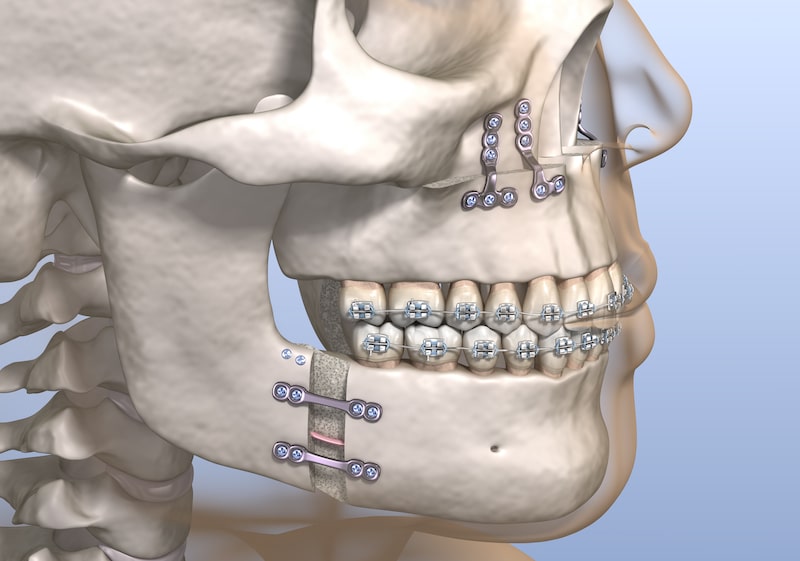Posted April 15, 2022 in Uncategorized
7 Minute Read:
Double jaw surgery is a type of orthognathic surgery performed by an oral, maxillofacial, plastic and cranio-facial surgeon where the upper jaw (maxilla) and lower jaw (mandible) is surgically detached and moved into an anatomically correct position for optimal teeth, bite, and jaw function (stomatognathic function).
This also helps with breathing and aesthetics.
This is a highly specialized and complicated procedure.

Can Double Jaw Surgery Improve My Facial Aesthetics?
Yes. Double jaw surgery, done by a talented and experienced team of specialists, can significantly enhance your facial aesthetics.
A comprehensive diagnosis, including a 3-D cephalometric analysis, jaw, TMJ, bite and smile analysis, and airway analysis, should be performed to help ensure optimal structure, function, airway, health, and aesthetics.
I Have a Recessive Chin. Does Chin Surgery (Genioplasty) Help Improve My Profile in Conjunction With Double Jaw Surgery?
Yes. Genioplasty is a very common procedure, done alone and in conjunction with surgery of the upper and/or lower jaw.
Is a Genioplasty Purely for Improved Aesthetics and Facial Proportions, or Can It Actually Enhance Function?
Genioplasty can be prescribed to improve aesthetics and facial proportions but can also be designed to improve your anatomical structure, function, and airway.
It is important that the genioplasty procedure is planned by a multidisciplinary team of specialists, since the genioplasty surgical technique can include a procedure that can improve the amount of oxygen you get during sleeping.
If the genioplasty is planned using a surgical technique specific for obstructive sleep apnea, it is considered functional as well as aesthetic.
Is Double Jaw Surgery Done Under General Anesthesia?
Yes. Double jaw surgery should be performed by a highly trained team of specialists under general anesthesia in a hospital or ambulatory surgical center with a AAAHC or equivalent certification.
Is Double Jaw Surgery Painful?
Double jaw surgery, without medication to control pain, would be painful.
However, pain can be very effectively controlled and managed. It is not necessary for patients to feel pain upon waking and recovering from double jaw surgery.
Specialists at Jaw Surgery Los Angeles have many years of specialized training in pain management and are very successful in controlling the pain based upon your biochemistry, physiology, and preference.
Do I Need to Have My Teeth Wired Shut Following Double Jaw Surgery?
No. Your teeth and jaws do not have to be wired shut following double jaw surgery at Jaw Surgery Los Angeles.
However, many surgeons did and still do wire your teeth shut for at least three weeks following double jaw surgery.
Protocols developed and routinely used at Jaw Surgery Los Angeles over the past 15 years by surgeons, orthodontists, and ENT’s trained at Stanford, UCLA, and USC, preclude the need to wire the teeth and jaws shut following jaw surgery.
Patients are most grateful not to have their jaws and teeth wired shut following orthognathic surgery.
Eating and drinking nutritional foods and liquids is a very important part of the recovery following double jaw surgery. Optimal nutritional diets and menus will be suggested.
Since the teeth and jaws are not wired shut following double jaw surgery, patients are counseled on maintaining a soft, no-chew diet for three weeks following jaw surgery.
This time allows the bone to heal sufficiently.
Patients who have had motor vehicle accidents or trauma, and need immediate emergency care at a hospital, will need to have their teeth and jaw wired shut for approximately three weeks.

What Are the Risks of Double Jaw Surgery?
Double jaw surgery is a highly specialized procedure best performed by a team of specialists with extensive training to help mitigate the risks.
Possible risks of double jaw surgery include:
- Nerve damage
- Bleeding
- Infection
- Incomplete union of the bones
- Malocclusion
- Soft-tissue changes
A comprehensive list of risks will be given to you, specific to your condition.
However, double jaw surgery, done exceptionally well by a highly specialized team, has a very high patient satisfaction.
Nevertheless, it is very important for all patients undergoing double jaw surgery to be individually evaluated and advised about the specific risks, options, alternatives, limitations, and non-surgical options available.
How Long Is the Double Jaw Surgery Operation?
An experienced team of surgeons can complete most double jaw surgeries in approximately four hours.
Are There Any Scars From Double Jaw Surgery?
An experienced team of surgeons can perform double jaw surgery with no facial scars, since all the surgical incisions are performed inside the mouth.
At What Age Can Patients Have Double Jaw Surgery?
Males can have double jaw surgery at any age between 21 and 75, depending upon the health of the patient.
Females can have double jaw surgery at any age between 15 and 75, depending upon the health of the patient.
Can Double Jaw Surgery Cause Nerve Damage That Affects Speech, Eating, Kissing, Talking, and Facial expression?
No. Speech, eating, kissing, talking and facial expressions are controlled by the seventh cranial nerve — called the facial nerve — which is a motor nerve.
Sensation and feeling is controlled by sensory nerves for example the trigeminal nerve and inferior alveolar nerve.
If the inferior alveolar nerve is severed, stretched, or damaged during double jaw surgery, patients can experience a sensory alteration and numbness in the gingival tissues (gums), chin, and lower lip.
This sensory numbness can be permanent.
A highly experienced team of surgeons with state-of-the-art imaging and computerized cephalometric analyses and careful planning can achieve an excellent surgical result and greatly reduce the risk of severing the inferior alveolar nerve during surgery.
What Is the Size of a Normal Airway?
Richard Jacobson, DMD, MS, measured the airway of 1300 individuals aged 6 to 60. (Published by the American Journal of Oral and Maxillofacial Surgery with Steven Schendel DDS MD (Chief of Surgery at Jaw Center LA, at that time and Professor Emeritus Stanford University).
- The average volume in 6 to 8-year-olds was 7.2 cm cubed and the smallest area was 77.7 mm squared.
- The average volume in 26 to 30-year-olds was 15.6 cm cubed and the smallest area was 172.2 mm squared.
- The average volume in 56+ year-olds was 13.1 cm cubed and the smallest area was 121.8 mm squared.
All measurements must be considered specifically for that individual and correlated with a comprehensive clinical examination and appropriate sleep study.
However, this study is relevant since it indicates a slowly decreasing anatomical airway in all people over time, after the age of 30. Thus, patients with a small airway tend to be at a greater risk of obstructive sleep apnea as they age.
This is likely related to the tissues of the airway becoming more relaxed and less toned over time, progressively contributing towards an effectively smaller airway during sleeping that is more prone to collapse during deep sleep, causing arousals that are disruptive to deep restful sleep.
Many people are so used to this slightly compromised state of rest and corresponding health, that they think it is normal for them. Unfortunately, it does affect their health.
One patient, after experiencing the difference following treatment said, “It is like leaving the brakes on in a car, adversely affecting the car’s performance. Now that I am getting sufficient oxygen at night following my treatment, I feel supercharged. I had no idea how much I was accommodating and compensating.”
Patients with a positive mindset tend to ignore a feeling of slight or moderate tiredness and find ways to overcome this. However, treatment is very effective and ignoring a potential health issue inevitably is not necessary.

Patients that are aware that they have severe obstructive sleep apnea do eventually seek treatment since the tiredness becomes debilitating. The earlier one can diagnose and treat obstructive sleep apnea, the healthier the rest of your life can be.
Patients that are overweight or that drink alcohol before sleeping or that take sedatives at night to help sleep, have a higher risk of obstructive sleep apnea.
Fortunately morning tiredness upon waking and obstructive sleep apnea can be effectively diagnosed and treated. Patients that do get effective treatment report a life changing feeling of health and rejuvenation.
Interested in Double Jaw Surgery?
Contact us today by calling (310) 361-3363 or filling out our online contact form.
